
Without web hosting a website is just a bunch of files on a computer. The best website builders come with hosting but sometimes it's cheaper and better to have more control and flexibility for your website. This is why I recommend taking hosting into your own hands. It's not difficult and these hosts all come with a website builder and business tools too.
Hosting is my full time job. Plus, building and hosting apps and sites is one of my favourite hobbies. From AI applications on custom VPS environments to WordPress websites for weddings on shared servers. This year I've done it all and these are my picks for the best web hosting providers.
Take advantage of these prices while you can
- Black Friday web hosting deals
- Black Friday WordPress hosting deals, and
- Black Friday VPS hosting deals
Best web hosting services of 2025
Best web hosting overall

Hostinger offers exceptional value for money across a range of hosting services from shared, VPS, and cloud. Starting prices for plans are as low as $2.49 a month for 48 months. Renewal prices are low too at only $11.99 for the Premium plan.
Performance is spectacular with a 99% performance guarantee. In my tests Hostinger showed fast loading times and the ability to handle surges in concurrent visitors easily.
The ease of use Hostinger provides is word-leading. It make web hosting as accessible as website builders. AI tools, and a simple hosting panel facilitate easy site creation and management.
Infrastructure is distributed over the entire globe so no matter where your business or customers are, you'll benefit from not only fast speeds but speedy support too.
Hostinger in detail
✅ Your hosting experience is limited
Hostinger make making, managing, and hosting a site easy. No learning curve, great support, and nice user interface.
If you're concerned that you lack technical skills and don't know what the best hosting plan is for your site, there are comparison posts and step-by-step guides on which plan is best for your small business and how to launch your first website in 24 hours, in addition to a range of AI tools
❌You're getting 250K+ visits a month
If you have a site that is already getting 250K+ visits a month you're unlikely to benefit from the range of tools Hostinger has for creating and managing a site. The Preimium and Business plans are also on shared infrastructure, so they could struggle with this volume of visitors. You'd be better off trying SiteGround or ScalaHosting because the infrastructure is designed to handle less sites with more site visits. If the server becomes overloaded more resources can easily be added for your site and geo redundancy will keep your site online should a disaster happen.
The Premium Hosting plan is perfect for content creators who want to create a visually stunning blog with fast load times to engage their readers and perform well in SEO. The onboarding process is very well streamlined and there is an AI website builder that helps novices make a site with zero technical knowledge. With the Premium Hosting plan, you can create and manage a site, monetize traffic, and retain complete control over the design.
You'll also find a large amount of case studies on how to create sites and boost traffic, plus tutorials on how to handle multimedia and why things like SSL are important for your site. It's hard to go wrong with this plan, especially with the starting price being $2.49 a month and offering a 30-day money back guarantee. There's not much to lose if you're having a go at creating and hosting your first website.
Hostinger's Business plan helps you create a professional-looking online store with minimal technical knowhow. The plan is very similar to the Premium Plan mentioned above, but comes with faster storage – and more of it. Plus, it allows you to have more files for a larger range of product listings and images. You also get daily backups, rather than weekly, to ensure you won't miss sales should a worst-case scenario happen, plus a CDN to help speed up traffic to customers around the world.
What I like
Hostinger is constantly innovating its products. For example, Hostinger recently integrated Dark Web scanning into hPanel. It seems like every few weeks another feature is added to hPanel or a new AI tool is launched to help you build and manage a website.
I used to rank Hostinger as best for beginners but because of the recent advancements in cloud computing and speed improvements across the hosting options I believe Hostinger is now a best overall option.
What I don't like
I find some of the aggressive sale prices a little misleading. For example, a .com domain name is $4.99 for the first year, but you need to buy it in a 2-year subscription, with the second year being more expensive compared to other domain registrars. Over the two years it's cheaper to buy a domain elsewhere, even with the discount. The other thing to watch out for is the renewal price. The Premium plan is listed as $7.99/mo when you renew, but that's only for the first renewal and it's not clear how many months you can buy at $7.99. When I asked Hostinger about the total cost of ownership over a period of time I didn't get a definitive answer. Despite this, the hosting plans are still good value.
Attributes |
Notes |
Rating |
|---|---|---|
Value for money |
The value is great considering the amount of helpful tools you have and how much it would cost to get a professional to build for you |
★★★★★ |
Ease of use & support |
From signing up to building any type of site, Hostinger has really made it easy |
★★★★★ |
Tools & features |
Hostinger has everything you need in one place (hosting, website builder, domains, email, security). Plus, everything is easy to use |
★★★★★ |
Performance |
It's not significantly ahead of the competition when it comes to speed but it's pretty fast |
★★★★☆ |
Testing & use
Our testing shows that Hostinger is more than capable of hosting an average website on a shared hosting plan. Hostinger scored slightly lower than average on LCP but does score higher on requests per second.
When using Hostinger I never felt out of depth. Everything is laid out clearly and is easy to use.
Read our full Hostinger review for a more in-depth analysis and full testing scores
Best web hosting for eCommerce
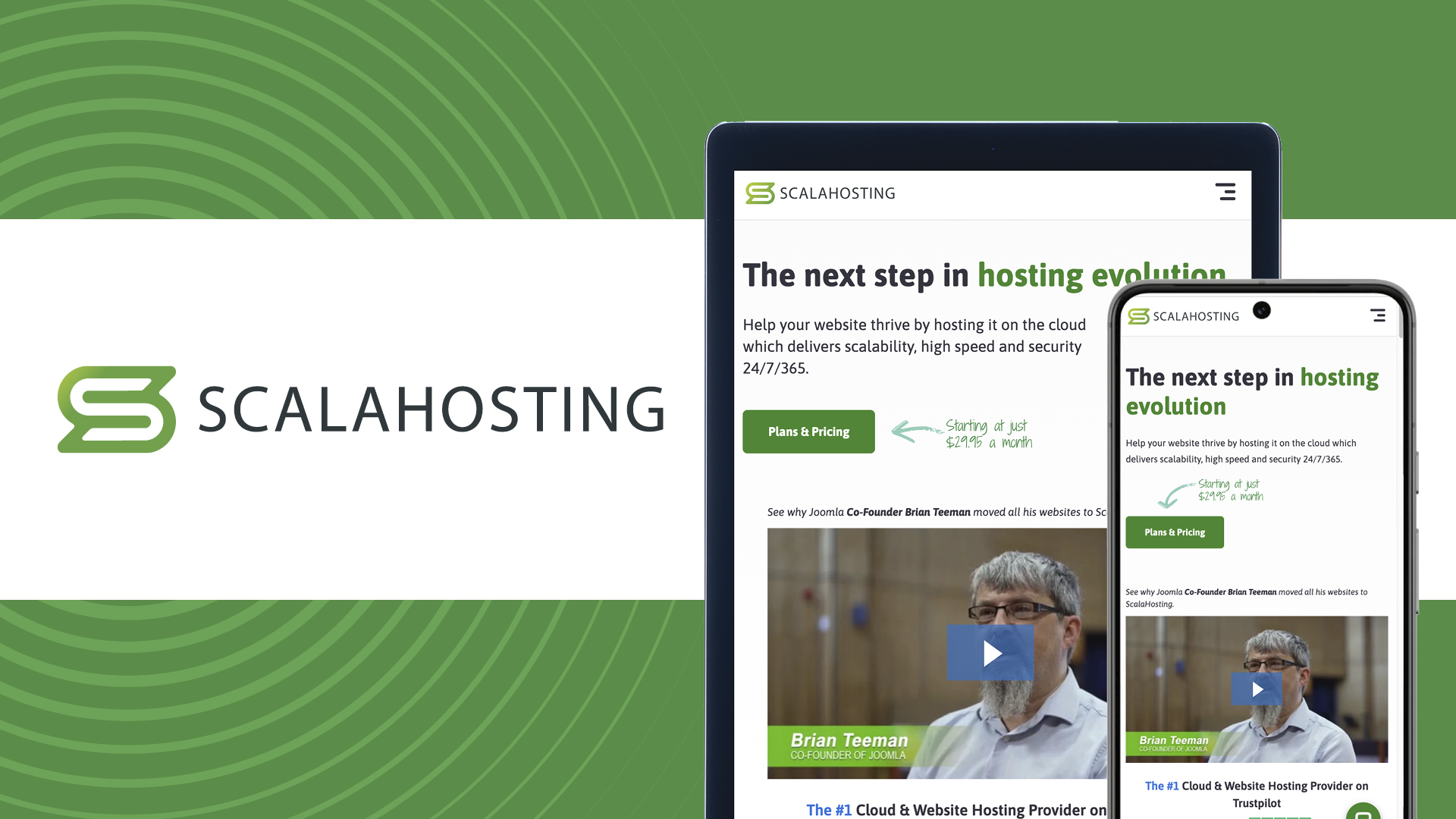
Studies show that poor web hosting costs business. Low site speeds and lack of functionality make customers leave a site, abandon shopping cars, and damage the reputation of a store. The difference between an eCommerce store on shared hosting and on a VPS can be less than $50 a month but it's worth the investment.
ScalaHosting's VPS plans are based on cloud infrastructure. This allows resources to easily scale to the demands of a website. If you get more visitors during a sales promotion, you site will still be as fast as usual. Plus, copies of your site are stored in multiple locations. Should a disaster occur, your site will never go offline.
Aside from bulletproof architecture ScalaHosting also offer amazing support. When using support I never felt like I was getting responses from a machine or script. The support is very friendly, human, and knowledgeable.
▶ ScalaHosting in detail
✅ You want simplicity and reliability
ScalaHosting is so confident in its services that it offers an anytime money-back guarantee. Great support, and cloud infrastructure ensure that you are very very unlikely to ever take it up on that offer. ScalaHosting also has some of the highest rated services from other online reviews, too. Meanwhile, ScalaHosting's UI is one of the simplest and cleanest, with the least amount of upsell – so using the service is just an all-round-pleasure.
❌ You don't have a high-value site
ScalaHosting's services come at a price. If you don't need the infrastructure or support to boost sales, there is no need to be paying extra. I'm not saying that ScalaHosting is expensive compared to other managed VPS services, but compared to shared or unmanaged hosting it's considerably more.
Custom-built servers on enterprise-level hardware with self-healing capabilities, plus on-demand scaling, ensure that you get high-performance all day, every day. If you're migrating to ScalaHosting you don't need to worry about that either, as it will migrate any number of sites for free.
SPanel is a defining feature of ScalaHosting that is specifically designed for VPS and if you want a feature you can request it through the Cloud Democracy project. If other web masters vote on your request you can see it implemented to help you and others in providing an easier management solution. SPanel also provides end-user live chat support, freeing up your time even further to be able to focus on your business. With the Build #2 plan coming in at $44.95 a month for the first year and then $91.95 a month after, you're buying more than just hosting for good value.
When you need high-performance websites for better SEO results and pages that load quickly for every customer and client reliably, cloud infrastructure is a solid choice. You also have an agency to run, so you don't want to be dealing with server management such as regular maintenance, monitoring, hardware setups, and dealing with technical issues. So, leave it to ScalaHosting's managed VPS plans and its seasoned support team.
What I like
When I tried to migrate my web app that was based on a Python-Flask environment, ScalaHosting's support was really helpful. It wasn't the easiest of environments to set up and it was scaled to the highest level of support where the technician did their magic and got everything working. The ticket could have escalated a bit quicker, but overall it was a good experience.
I like ScalaHosting a lot and I've recommend them for a lot of different categories. ScalaHosting have always been brilliant and for that reason hard to define what they're best at. Recently there has been a bigger focus on ecommerce at ScalaHosting and are now the recommended hosting provider by Opencart. I don't think ScalaHosting are not good as an enterprise option anymore or that they're not good for agencies, just that right now they stand out as the best ecommerce hosting option.
What I don't like
Support had a tendency to assume that the ticket submitter had more knowledge than they did. If you're not somewhat clued up on web hosting solving some problems could be challenging, even with the high level of support.
Attributes |
Notes |
Rating |
|---|---|---|
Value for money |
The standard plans are well resourced you get a lot extra thrown in with SPanel |
★★★★☆ |
Ease of use & support |
There's a 20-30 minute learning curve for SPanel but once you climb it you'll benefit from the features. Support are really good with custom environments |
★★★★★ |
Tools & features |
End user chat support in a hosting panel and the ability to request features is a bonus |
★★★★☆ |
Performance |
ScalaHosting performed well with their Mini plan |
★★★★☆ |
Test results
In previous tests ScalaHosting performed well with its Mini plan. We also hosted a Python-Flask based web app that required a more complex server environment which the support coped with well.
See our full ScalaHosting review for a more in depth analysis and full metric scores.
Best web hosting for small business

SiteGround was founded by a group of university friends and has remained an independent company. From modest beginnings, SiteGround now have four servers across the US, five in Europe, one in Asia, and one in Australia.
Although SiteGround is entirely based on Google Cloud infrastructure, there are plenty of in-house technologies and innovation. SiteGround has its own CDN network, SuperCacher, and are usually the first to adopt the latest iterations of technology such as Let's Encrypt SSL, PHP 7, and HTTP/2.
SiteGround is best for small business because the servers are more robust than many shared servers but are cheaper than the more powerful VPS plans. If you're running a small business that doesn't require the most powerful servers on the market SiteGround is the best option.
▶ SiteGround in depth
✅ You have an established site
You might find that your current web hosting service is reaching its limit despite being within the monthly visitor quota. This is because the limit is often vastly over estimated and doesn't anticipate peak times or the complexity of an individual site. If the site visit number is an average and you're using above average resources (half of you will) the number of visits a month your hosting can handle will drop. SiteGround is careful about how it manages its servers, and cloud infrastructure enables servers to be better balanced to always keep up with demand.
❌ You need a custom server environment
SiteGround is not upfront about what it can and cannot do. I tried migrating a Python-Flask-based web app, which seemed like it would be supported – but SiteGround was unable to configure the server environment. If your site is WordPress-based or uses a common environment you'll be fine, but I wouldn't risk migrating something a little out of the ordinary. For this I would use Scalahosting, InMotion Hosting, or Liquid Web.
SiteGround's GrowBig plan is user friendly and has all the tools you need for your businesses, such as a reliable email service with free spam protection and webmail. You can also install a shopping cart of your choice and benefit from the speed of Google Cloud's infrastructure, which also brings with it green credentials.
SiteGround is our top pick for best small business web hosting as it has won multiple awards for customer service. Plus, SiteGround's client area has all the tools you need in one place, including a file manager, site scanner, SuperCacher for speed, and a staging environment.
As a small business owner it's important to establish a strong online presence for your business, ensuring that your site loads quickly, and is secure. This helps you maximize sale opportunities at all costs and based on my testing I think SiteGround does this the best.
Storage might look a little modest compared to other hosts like Hostinger, but it's not really comparable because Hostinger and many others require you to reserve some storage for backups (not giving you full use of your resources). SiteGround doesn't do this and gives you the full storage to use at your own leisure. You'll find this limitation with other hosts, too, so be sure to always check the small print.
This will cost you $4.99 a month for the first year and $29.99 a month thereafter (on a 12-month plan). Personally, I'd choose the 24-month plan unless you definitely only want hosting for one year. The 12-month plan technically offers a bigger discount – at 83% off – but over two years you'll pay $419.76 in total, whereas on the two-year plan it will work out at $299.76 overall.
What I like
SiteGround works on Google Cloud infrastructure, which uses environmentally friendly practices so your website is green and good for the planet. SiteGround also supports WordPress quite significantly and has been doing so with code contributions and via sponsorship of WordPress events.
What I don't like
The AI chat assistant is plain annoying and feels like a barrier to speaking to a real person. You can bypass this by clicking 'Contact us' and going through some questions before getting to a real person. SiteGround takes care of server-level maintenance and provides basic support, but your site is still managed by you. You can request additional help with optimizations for your site, but you'll need to pay for additional management credits – which can feel frustrating when you're unsure where the line is between your responsibility and theirs.
Attributes |
Notes |
Rating |
|---|---|---|
Value for money |
The value for money is there, considering the quality of the hosting and features |
★★★★☆ |
Ease of use & support |
One click installers and great support make SiteGround easy to use. It's still aimed more at people who are expected to know a little more than the basics, but beginners can use them too |
★★★★☆ |
Tools & features |
SiteGround's daily backups and CDN are essential features and come as standard |
★★★★☆ |
Speed test |
Higher than average |
★★★★☆ |
Test results
My results showed that SiteGround is more than capable of providing fast speeds for websites and maintaining uptime, which is critical for online stores. We're currently doing more tests on more SiteGround plans to verify whether the stated monthly visits are realistic.
For a more in depth review and metric scores for SiteGround see our full SiteGround review
Best web hosting for beginners

I've spent a lot of time using DreamHost this year and I can confidently say that they're my top pick for beginners. I spent some time reacquainting myself over one hour with DreamHost, plus did a direct comparison with out top pick, Hostinger, in a DreamHost vs Hostinger head-to-head article.
If you've read those articles you'll notice that I didn't get along perfectly well with all the tools but there was a big stand-out feature that makes this web host best for beginners and that's the offer for a person to build an entire website for you.
Then, there are additional business tools such as an AI business advisor and AI content creation tools to help you even more.
Since my last DreamHost review and articles DreamHost has had a major upgrade. Servers have had a revamp and there are additional data center locations helping contribute to a global presence. The price has gone up but that's reflected in the better service. Plus, it's still cheaper than most hosts.
▶ DreamHost in depth
✅ This is your first site
Website builders and business tools can help complete beginners with no business or hosting experience get online but the biggest reason DreamHost are best for beginners is because they'll build your website for you
❌ Not all tools worked as expected
When I used DreamHost the Business Advisor tool and AI content generation tool didn't work. That's not to say they wouldn't have worked if I'd have used the service for a bit longer.
Say you're a brilliant designer, photographer, or writer and you want a website to feature your work without taking time away from your creativity and without needing to fork out a decent chunk of money. DreamHost has got you. DreamHost's hosting plans provide all the essential tools to get beginners online, keeping hosting a site simple and cost effective.
If you have limited technical skills and budget, DreamHost offer an affordable hosting solution that also has a streamlined set up and with tonnes of practical advice you'll be able to create and manage your site with ease. WordPress comes pre-installed so you don't have to figure any of that out and DreamHost's Liftoff website builder is powered by AI. If building your own site is not something you want to do or something you struggle with, DreamHost will build your site for you.
What I like
I like that DreamHost will step in and help you get online if for whatever reason you didn't quite manage to create a site. It's for these reasons that I think DreamHost is brilliant beginner option and not just good for blogs and portfolios.
What I don't like
I use the AI Business advisor and AI content creation tools as justification for this recommendation because I think they're useful for beginners but I think anyone with a bit more experience could easily use ChatGPT or Claude for the same effect. Beginner friendly, yes. The best, maybe not.
Attributes |
Notes |
Rating |
|---|---|---|
Value for money |
Some of the lowest prices we see for good quality hosting |
★★★★★ |
Ease of use & support |
We didn't find anything difficult to use in our testing |
★★★★☆ |
Tools & features |
The plans are cheap but lack features |
★★★☆☆ |
Performance |
Again we cannot score them highly on speed but in this category it's not a defining statistic |
★★★☆☆ |
Test results
Our test shows that DreamHost takes every so slightly longer to load a page and slightly longer to respond compared to the other hosts but they're half the price and those metrics are not that important for beginner sites. Uptime is great and requests per second are impressive too considering the cost of the plans. There really isn't anything to complain about here.
Best web hosting for WordPress

Bluehost has gone all-in on WordPress. So, if you're looking to start your first WordPress site, it's a good option. Bluehost has been paying to use the WordPress trademark in its hosting, contributes to WordPress code, sponsors WordPress events.
This means that BlueHost are shieled from potential disruptions from WordPress and has developed a WordPress academy to help beginners get to grips with WordPress.
Every host has its own idea on what makes good WordPress hosting and Bluehost thinks it's down to performance, scalability, support, and flexibility. WordPress can be hosted on all types of servers and it's really down to your own site's requirements on where it will perform best, but if you're new to WordPress and are looking to learn the ropes, then Bluehost is a good start.
▶ Bluehost in depth
✅ Learning WordPress is your goal
The Bluehost WordPress academy provides free online courses covering the basics and advanced elements of WordPress. It can help you overcome common WordPress challenges and complete WordPress tasks. It comes in the form of articles and videos and is suitable for beginners and veteran WordPress users. The topics cover everything from building a site to installing plugins, optimizing SEO, and maintenance.
❌ You've hosted sites before
Bluehost's value is mostly in the aspects of learning WordPress and it lacks some features. The performance is good, but the lack of features means that it's not quite worth the money. If you can make do with other online tutorials, Hostinger and SiteGround could be better options for WordPress depending on the requirements of your site.
I've singled Bluehost out for best WordPress hosting because of the WordPress academy and the years in the WordPress game. Also, it's favoured by WordPress because it gives WordPress money to use the rights to the name and support the community. So, it's possible you'll have an easier ride than say, GoDaddy or WP Engine have had when Matthew Mullenweg starts calling for contributions.
That's not all the plan is good for, though. The estimated 100 concurrent site visits and 40K site visits a month is quite high, considering the cost compared with Hostinger – which estimates 25K visits for a plan at the same price point. You also get the standard security features like SSL certificates, anti DDoS, and malware protection.
Specific WordPress optimizations include WordPress pre-installed on the server, a WordPress migration tool, free Yoast SEO plugin, SSH and WP-CLI access for developers, and managed WordPress updates.
There are two big omissions however, and that includes a lack of backups and email.
What I like
I like the support of the WordPress community. WordPress is open source and requires a lot of upkeep, maintenance, and innovation to stay competitive. To keep this remaining free for everyone we need entities to contribute to WordPress. If they don't, it will not progress, it will become more vulnerable to attack, and we could see the end of one of the biggest free and open source projects in the world. How aggressively those contributions should be collected is something WordPress is struggling with now.
What I don't like
The lack of free backups is a shocking omission to a hosting plan. You can back up yourself, but it's something that's included in almost every other hosting plan and something that is so essential to keeping a website online in the worst-case scenarios. I really feel like this is a bit of an aggressive strategy in trying to gain more money out of the customers that are already paying a fair price for what they get.
Attributes |
Notes |
Rating |
|---|---|---|
Value for money |
After the first year there are no free backups. It'll be an additional $3.99 a month |
★★★☆☆ |
Ease of use & support |
Onboarding and setting up a site is easy. I'm not giving 5 stars here because the documentation could be a little more accessible for beginners |
★★★★☆ |
Features |
Bluehost gets 4 stars here because of the AI builder tools and wide support for WordPress plugins |
★★★★☆ |
Performance |
A large amount of site views for the money you pay |
★★★★★ |
Test results
Our tests showed that Bluehost had a 100% uptime over the duration of the testing period. The LCP was also impressive showing that the plan was powerful enough to quickly load sites with high quality content. Bluehost also scored just above average, managing to handle 15 requests per second – so if you're lucky enough to get that popular you'll be OK with Bluehost. Bluehost are moving to Oracle Cloud so once that happens we'll do some more testing to see how that might have changed performance.
For a more in depth review and metric scores for Bluehost see our full Bluehost review
Best cheap hosting
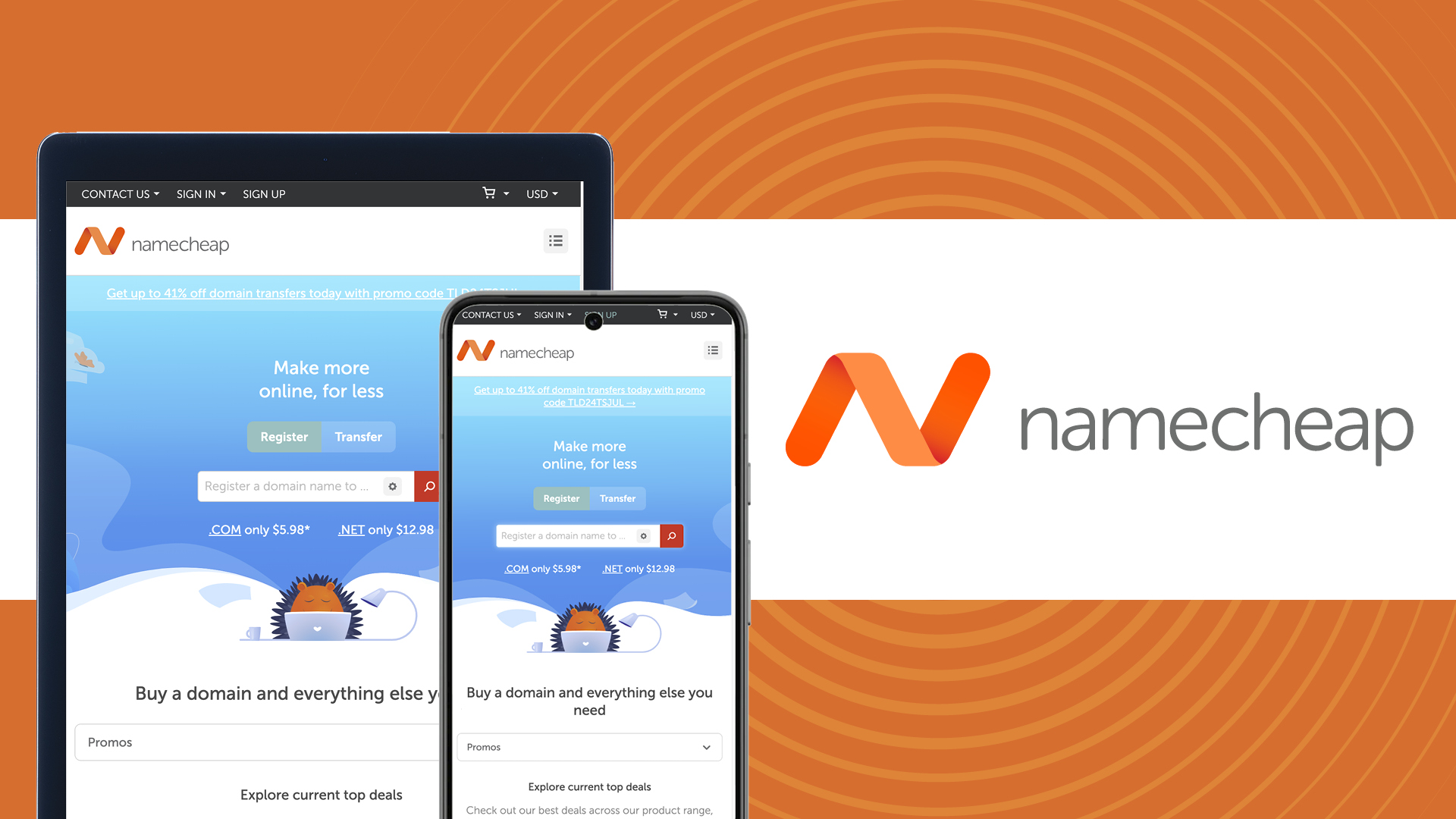
Namecheap started out as a domain registrar. It then branched out with the aim to create cheap but high quality products and services for web developers. It now has a range of hosting plans from shared to dedicated.
Namecheap also has its own range of services including a CDN network, security tools, email, and marketing tools. All of which are as you would expect with a name like Namecheap.
Although made for developers, everything is still very easy to use and anyone with only a little hosting experience or a willingness to learn shouldn't be put off trying the services. The reward is great hosting for a seriously good price.
▶ Namecheap in depth
✅ You're on a budget
Obviously, it should go without saying that the cheap option is best for the pocket. You do get a more bare-bones experience and there is more value when you use a plan like Hostinger or SiteGround. Still, the servers are reliable and you get what you pay for.
❌ You have a global audience
There are relatively little datacenters. While there is a CDN network you can use, it's not going to be the same as having a datacenter close to you or your site visitors. Before you use Namecheap, you should check the datacenter locations to see whether they're close to your target market.
Prices are temptingly low, and the specs are quite impressive. The shared plans get a free domain with domain privacy, at least 3 websites and 30 email accounts, and 1-click WordPress installs and more. Just watch out, SSL is free only for the first year for shared hosting plans.
This wide range of products and pick-and-mix like options allows you to manage websites with multiple suppliers providing different levels of functionality for complex to simple builds.
The hosting is cheap. Take the Quasar VPS plan for example, 4 vCPU cores and 6 GB RAM is $15.88 a month after renewal. Keep in mind that the plan is unmanaged and doesn't come with a web panel so there will be additional expenses if you require those things which is why if you've got a bunch of different projects with differing requirements that you want to manage under one roof, Namecheap is the best option.
The shared hosting is even cheaper. Which is to be expected for a shared web hosting plan but this really cheap. At $1.98/mo for the first year and then only $4.48 a month thereafter. For this, you get an AI website builder, 30 mailboxes and a free domain.
Just watch out for the renewal price on domains as they can be a little misleading.
Read our full Namecheap review
What I like
I like that Namecheap are offering a truly cheap plan that still offers reliability. Sure, the speeds are not the fastest but the uptime is excellent. I also like that everything is under one roof. I don't usually like putting everything on one basket but I'd happily buy my hosting and domains all from Namecheap due to the stability that comes from a provider that was founded before the millennium.
I used to recommend Namecheap as best for devs. Recent testing showed me that there are more powerful plans that could be more suitable for development and that the value Namecheap offers is all round cheap hosting. Devs can still take advantage of this but so can anyone looking for the best cheap hosting.
What I don't like
When it comes to domain names the pricing is very confusing. Namecheap will discount the first year price making it seem like the price before discount is the renewal price but it's not. That's just the first year price. The renewal price, and then the
Attributes |
Notes |
Rating |
|---|---|---|
Value for money |
The value is good if you don't require everything for every project |
★★★★★ |
Ease of use & support |
Not exactly built for beginners but the features are not hard to use |
★★★☆☆ |
Tools & features |
There are features for everything at a good price but none stand out as industry leading |
★★★★☆ |
Performance |
Our site speed was average in our speed test |
★★★☆☆ |
Test results
Namecheap's account control panel confused us at first, with lists, sidebars, menus and icons everywhere we looked. But once we'd spent a few moments exploring and mastering the basics, the dashboard worked very well, giving us quick and easy access to all the most important site management areas.
Although Namecheap deserves credit for its wide range of hosting products, the high-end plans in particular don't give you the choice of the top competition. There are only three VPS plans, for instance, and no Windows hosting.
Our tests found Namecheap achieved 100% uptime over the period: great news. Speeds weren't quite as impressive, with our site (on a shared hosting plan) managing slightly below average load times. They were still very acceptable for a budget host, though, and overall Namecheap offers good value for what you get.
Best for gamers
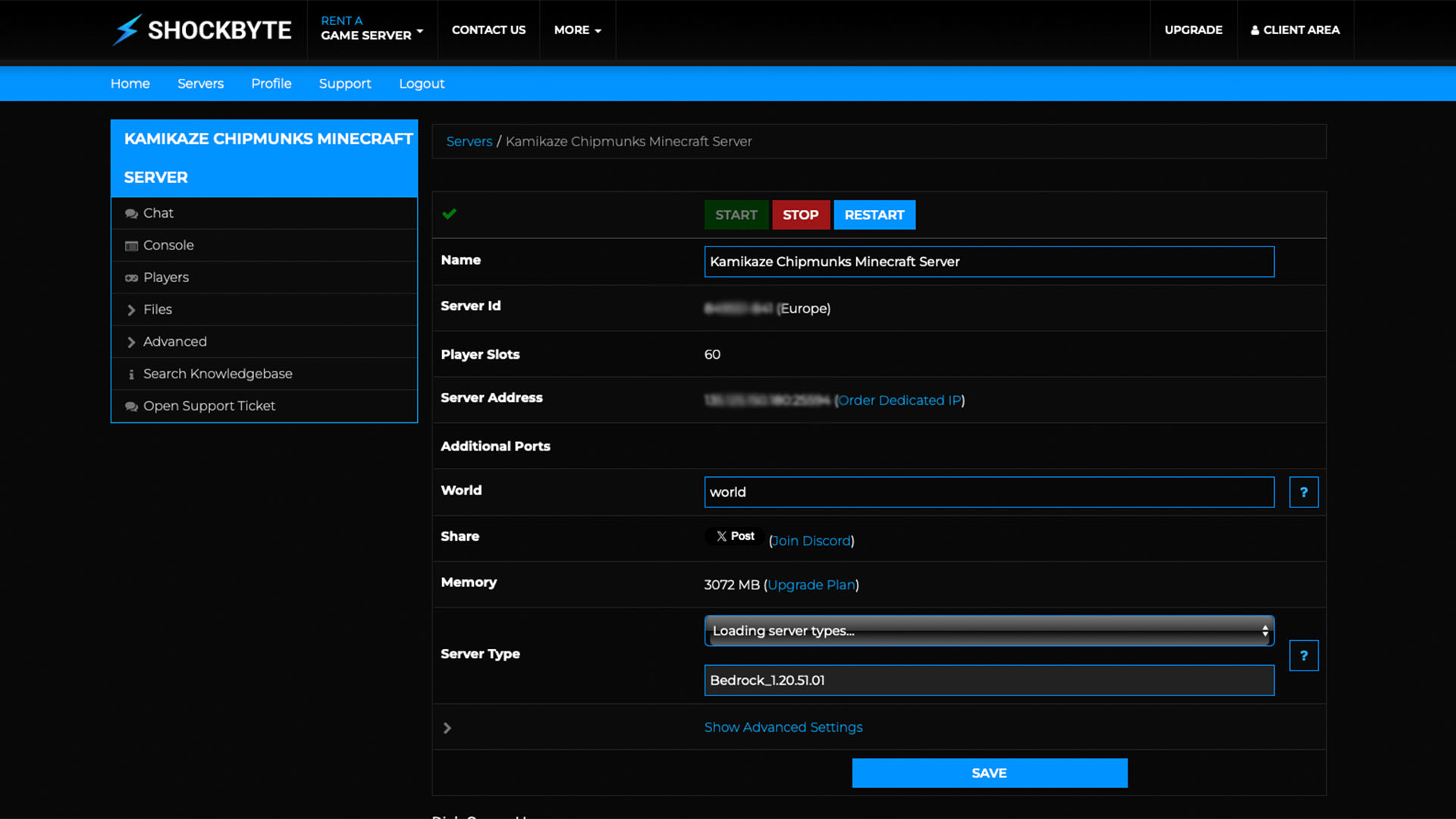
Minecraft hosting Australia-based Shockbyte is one of the biggest names in Minecraft hosting and has a presence in Europe (the UK, Germany, France, and Poland), Asia (Singapore), and North America (the USA and Canada). As a dedicated gaming server provider with great reviews and a global network, they don't come much better than this.
▶ Shockbyte in depth
✅ You love playing online games
Shockbyte are one of the most popular game server hosting providers. The plans are easy to use and offer great performance. The plans are all pre configured and secure leaving you to play and not need to worry about server management.
❌ You have game hosting experience
If you know how to configure a server for maximum performance and security then it would be better to purchase your own VPS and do it yourself. There are reports that the support can be a little slow and the servers can struggle with complex configurations.
Shockbyte is one of our favorite game server hosts and we rank it top in best Minecraft server hosting and best game server hosting overall.
The company is based on Australia but has servers and support available worldwide. There are 12 different plans for Minecraft alone. Each plan supports Java and Bedrock Edition. Plus, plans for Satisfactory, Ark Survival Evolved, and many more.
The plans have lots of great features. All plans still come with DDoS protection, NVMe storage, and unlimited bandwidth. The control panel is easy to use you can have multiple server configurations on one plan.
There are also one click installers for popular mod packs. Overall, Shockbyte offer a very comprehensive and easy to use game server hosting solutions for beginners and experienced gamers.
What I like
I like that everything is so easy to use. It can be quite complex to set up your own VPS for gaming. From experience, it's annoying when you have finished a long day and you're looking forward to gaming only to be met with multiple barriers.
What I don't like
There are some user reports of slow response times from support. I didn't experience this but there have been enough comments online to let me believe that this could be a theme at Shockbyte. Usually everything works very well so this shouldn't be an issue.
Attributes |
Notes |
Rating |
|---|---|---|
Value for money |
There have been some price increases recently but still good value for money |
★★★★☆ |
Ease of use |
Lots of out-of-the-box features that require no skills to use |
★★★★★ |
Features |
Important and vital features including DDoS protection supported |
★★★★★ |
Speed test |
We had no lag or downtime playing Minecraft |
★★★★☆ |
Test results
We got a steady 30-35ms ping when using Shockbyte which is enough to play without lag. We also didn't get any downtime. Plus, when we invited friends from all over the world to play we didn't suffer any drop in quality.
Read our full Shockbyte review
Best shared web hosting
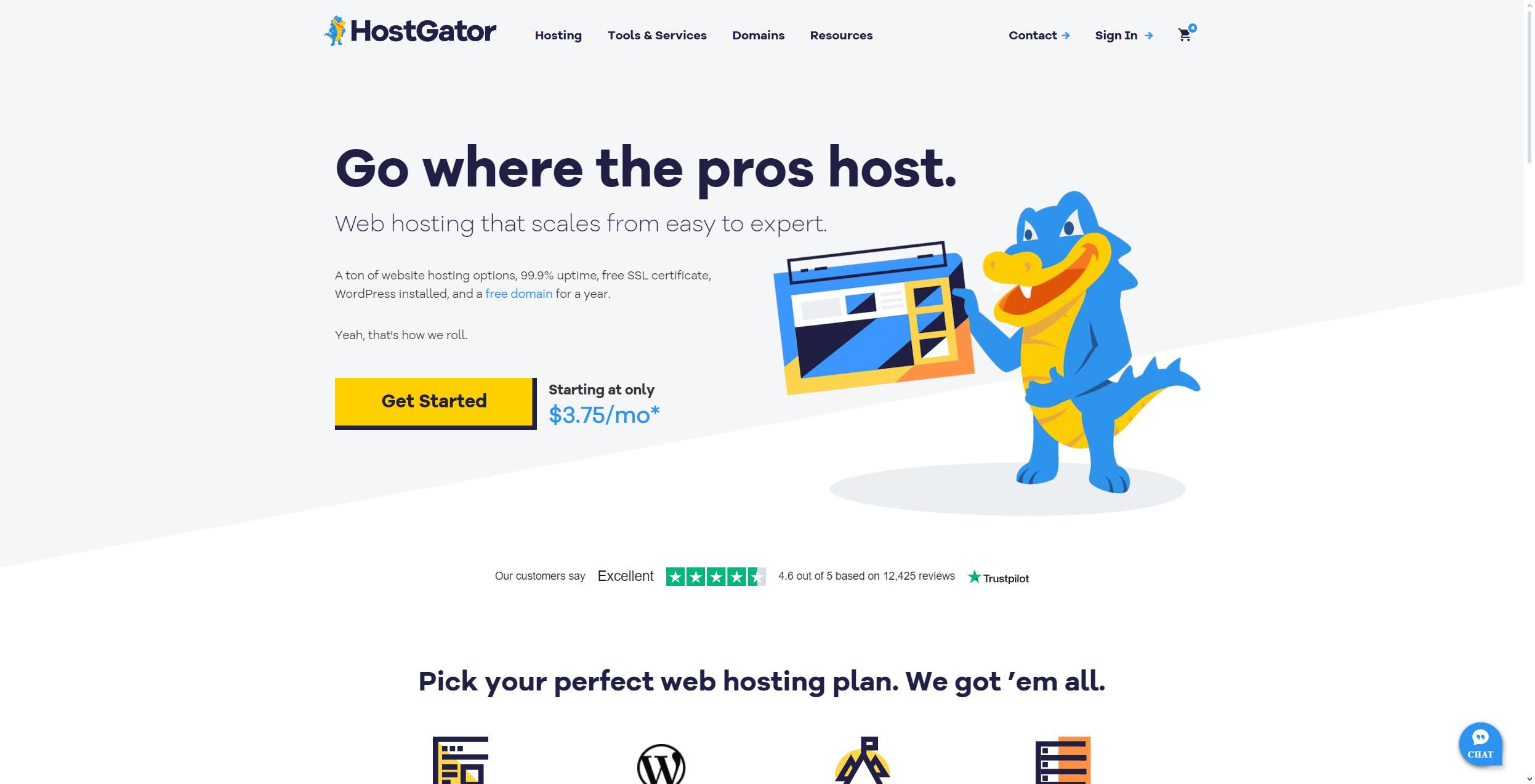
HostGator offers a decent set of features on all its shared hosting plans. The cheapest Hatchling plan includes unmetered bandwidth, a free domain for the first year, and free SSL.
HostGator gives you easy integration with some of the biggest names around, including CodeGuard for backups, SiteLock Security for malware scanning, and Google WorkSpace for team collaboration.
You can scale your site with HostGator. If you out grow your shared hosting you can easily upgrade to a HostGator VPS or dedicated hosting plan.
If you like talking rather than typing to support, HostGator are one of the last hosts to offer phone support. There is also chat support via Live Chat and also X if you want to discuss your issue in a public forum.
▶ HostGator in depth
✅ You're based in the US
HostGator only have US servers and a US phone support number. If you're based in the US this isn't a problem obviously. Above the baseline plan you get the Cloudflare CDN for global coverage outside of the US too but if you're outside of the US it would be better to choose a different host.
❌ You're on a budget
HostGator's plans start cheap but prices soar after renewal. It is true that most hosts increase their prices on renewal but HostGator also start charging for more things that were only included as free trials more than compared with others.
For the best shared hosting HostGator is my stand out pick. I've used hundreds of hosts over the years and if you just want some simple shared hosting then HostGator.
Although in our tests we did have some downtime, this was unusual and it's not something that's happened again or been reported widely by other users. Overall, the performance from shared hosting was good and enough for things like blogs, portfolios, and statics sites.
HostGator have stayed with cPanel which was seen for a long time as the industry standard panel. Now, most hosts have their own hosting panel to manage websites which can require some learning. Most are familiar with cPanel and if you're not there are lots of tutorials online.
What I like
I like when things just work. Everything at HostGator is very simple on tried and tested infrastructure. The hosting panel, servers, and support are all robust and function smoothly without the need for frequent management.
What I don't like
It seems to be a theme across Newfold Digital brands to make backups a paid for add-on. Backups are essential. Without backups you could lose everything you've worked hard on. Most hosts include backups as a standard feature and are not more expensive per month.
Attributes |
Notes |
Rating |
|---|---|---|
Value for money |
HostGator is affordable but the add-ons could get pricey if you pick a cheaper plan |
★★★★☆ |
Ease of use |
We found it easy to get started and navigate through the dashboard |
★★★★☆ |
Features |
HostGator has just about every feature you'll need from a web host |
★★★★★ |
Speed test |
HostGator performed the best in our speed test compared to the other hosts for shared hosting |
★★★★★ |
Test results
In our tests HostGator was one of the fastest hosts but did suffer some downtime. The downtime was still high and compared with the fast speeds it still makes HostGator one of the best shared hosting providers. Under heavy load our server easily managed 15 concurrent visitors with no drop in quality.
Best VPS hosting
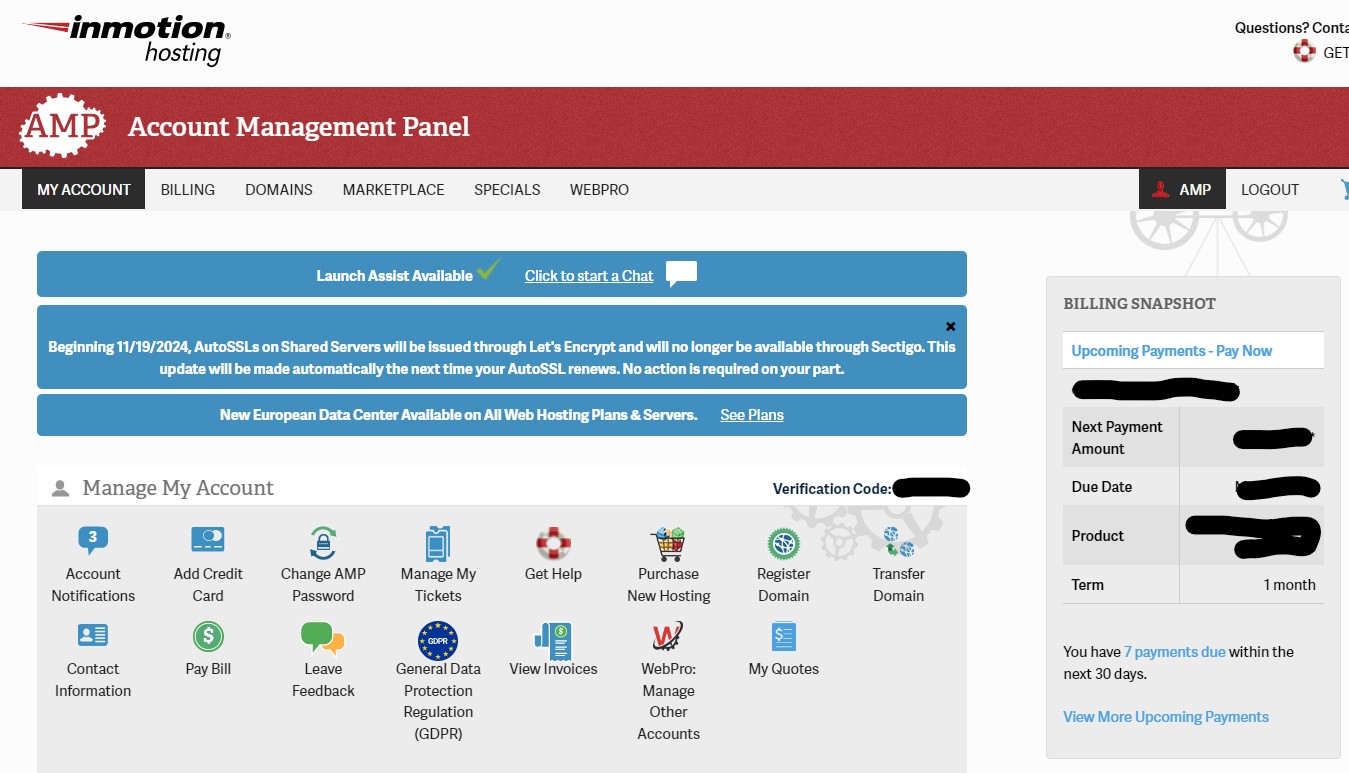
ln Motion hosting have been providing hosting services since 2001 and now have over 170,000 customers. The VPS plans are my top pick because of the high-performance hardware like NVMe SSD storage and security. Not only does InMotion Hosting offer standard security features but datacenters are also protected by armed guards.
There are four VPS tiers on offer starting at $4.49/mo (on a one year subscription) and going up to $119.99/mo for the highest spec plan. These plans are not the most budget friendly option but with all the features added in they are good value. For example, most VPS plans come with at least two dedicated IP addresses.
▶ InMotion Hosting in depth
✅ You want help getting your business online
Each managed VPS plan comes with 2 hours launch assist. This can help you with site optimization, custom configurations, and cyber security. The specialists are available 24/7 via chat. Additional help can be purchased in two hour blocks at $199.
❌ You know your way around a VPS
There are much cheaper unmanaged VPS plans around. If you can take care of security and server optimization yourself then you won't be getting the most value for money.
InMotion Hosting VPS plans offer a good balance between compute, RAM, and storage. There is also a choice of control panels. cPanel is an optional extra starting at $25.50/mo. If you want a cheaper options you can use one of the best cPanel alternatives or the free basic version of CWP.
Performance benefits from NVMe storage which provides faster page load times and highly responsive applications. This is especially true when resource intensive CMS and large databases are involved.
Infrastructure utilizes modern cooling systems which are environmentally friendly and increase the efficiency of servers. Each VPS plan also benefits from redundancy. If there is a problem with your server additional hardware can quickly be used to take over workloads to ensure that you won't experience any downtime.
The first tier which was introduced recently starts at $13.99/mo but is $4.49 a month for the first year. Unlike other hosting plans this discount is only available for one year. This plan gives you 2 vCPUs, 4GB RAM, 50GB NVMe storage, and one dedicated IP. You also get free SSL, DDoS protection.
All other VPS plans have a three year discount plan available. Progressing from the basic level plan resources increase across the board. CPU increases by 4 cores for each plan and RAM increases by 4. The amount of dedicated IPs for each plan also increases.
What I like
Gen 4 NVMe SSDs on the higher tier VPS plans is a marked improvement over the best VPS hosting competitors. I also think launch assist is a really valuable feature for lots of people that might have tried vibe coding their own app and need to set up a server environment but don't have the knowhow.
What I don't like
I'm not a massive fan of the dated look. I know some might like the familiarity and nostalgia of it but it just feel unsettling to me. It also feels a bit cluttered.
Attributes |
Notes |
Rating |
|---|---|---|
Value for money |
Everything you would expect for the price plus more |
★★★★☆ |
Ease of use |
UI takes a little getting used to |
★★★☆☆ |
Features |
Multiple dedicated IPs and launch assist are very welcome features |
★★★★☆ |
Speed test |
One of the best hosts in our tests |
★★★★☆ |
Test results
Over two weeks of monitoring InMotion Hosting scored 100% for uptime. The server also averaged a response time of 0.340 seconds. Compared with budget hosting options page load times were significantly lower.
See my full InMotion Hosting review
Best cloud hosting

Liquid Web is another web host on this list founded before the millennium. Founded in 1997, Liquid Web is an expert provider of top-quality managed hosting solutions for everything from email to WordPress, WooCommerce, VPS, dedicated all based on cloud infrastructure.
The service isn't aimed at low-end hosting. It doesn't have a shared hosting range - but if your priority is less on price, more on speed, reliability and features, then Liquid Web has a lot to offer.
Last year Liquid Web purchased Nexcess which has now been fully absorbed into Liquid Web bolstering their managed hosting options.
▶ Liquid web in depth
✅ You need high performance managed hosting
Liquid Web has built itself around providing the best cloud hosting with reliable and speedy support. For enterprise-level websites Liquid Web is one of the top choices thanks to the performance and management offered.
❌ Your site doesn't get loads of visitors
Liquid Web's offering is aimed directly at enterprise and web developers. The price reflects this. The unmanaged VPS plans are powerful but pricey and the managed cloud VPS plans and dedicated plans are also only worth the price your website is essential to your business.
Liquid Web's range looks expensive, but this is really the top level of hosting. Some budget hosts might start their VPS range with a tiny $1 or $2 a month plan, but the hardware is not top quality and uptime is not highly guaranteed. Liquid Web starts cloud VPS plans at $5/mo but they're unmanaged and when panels and management are factored in the price can jump up to $92/mo.
Liquid Web offers access to an amazing 10Gbps network connection, 10-30x the speed that other hosts support. There's no messing around by promising 'unmetered' bandwidth, which typically means 'there's a limit but I won't tell you what it is.' Instead, even the plans range from 1TB to 10TB.
If you haven't got the resources or knowledge to undertake key maintenance tasks, then a managed hosting service is essential. These can be carried out by your web hosting provider - and in my experience, Liquid Web made it really easy to monitor and manage my test website. Liquid Web offers 99.999% uptime and has a strict Service Level Guarantee explaining how you'll be compensated should you have downtime.
Liquid Web's dashboard design is clean and straightforward, and I found it easy to locate everything necessary to monitor and manage my website.
What I like
I like the transparent pricing from Liquid Web. Far too often in hosting it's hard to workout how much things will cost you over a prolonged period of time. Liquid Web doesn't offer discounts and renewal prices that don't reflect the true pricing of a hosting plan after the promotional periods end. It's very easy to build your hosting plan and know what you're paying from the beginning.
What I don't like
When I used Liquid Web I tried to set up a server environment on an unmanaged server using the help pages. I encountered some mistakes in the documentation that caused issues. When I reached out for help from support I was told that I was on my own due to my plan being unmanaged. A seasoned developer could identify the issue very quickly but a beginner would be lead down a path by the documentation requiring them to pay for support in a scenario that I believe should have been rectified free of charge.
Attributes |
Notes |
Rating |
|---|---|---|
Value for money |
Liquid Web is more costly but you get what you pay for |
★★★★☆ |
Ease of use |
Mistakes in the documentation mean this host isn't the best for beginners |
★★★☆☆ |
Features |
Plenty of features including scalability |
★★★★☆ |
Speed test |
Our tests showed speedy scores even on the cheapest plans |
★★★★☆ |
Test results
After installing a standard test WordPress website, in-depth monitoring throughout the review found excellent load times and 100% uptime. For more complex things like setting up a server environment I found that you need to have a good level of technical knowledge otherwise you'll find yourself in expensive trouble. If you need a lower-end VPS and support I suggest using ScalaHosting.
See my full Liquid Web review
Best web hosting for agencies
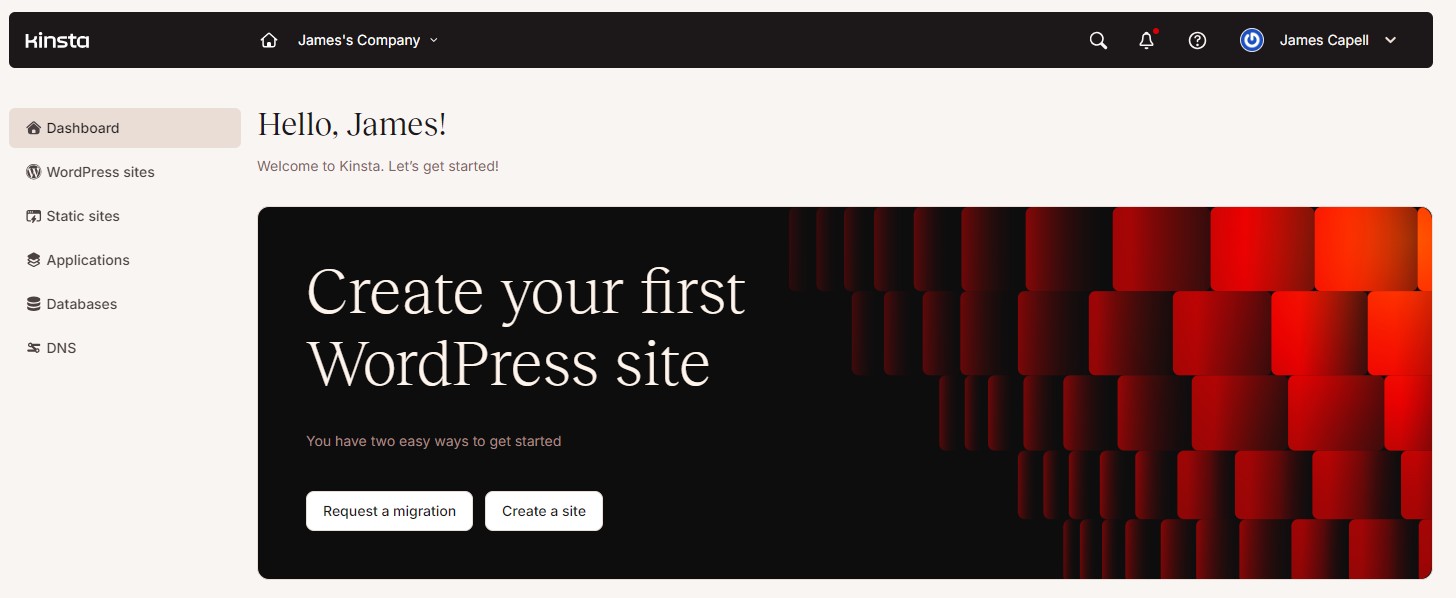
Kinsta
▶ Kinsta in depth
✅ You want to manage permissions
Kinsta has a really easy to use permission management system. You can easily grant six different management levels to users giving them different access and permissions across your hosting panel and individual website levels.
❌ You're a large agency or manage custom websites
Kinsta's largest agency plan supports 60 WordPress installs and each plan is optimized for WordPress. There is some level of flexibility but if you have lots of custom sites you might be better off with ScalaHosting's cloud VPS.
After testing Kinsta and doing a Kinsta vs Siteground comparison it was Kinsta that came out on top as my recommendation for best hosting for agencies.
This is thanks to containerized infrastructure for all WordPress installs which can provider higher levels of performance and stability than shared while not having the management overheads of VPS.
Kinsta also offer a unique security pledge. In the unlikely scenario that one of your sites is infected Kinsta will offer free malware cleaning. Other advantages include a staging area for each site, free hosting for your own company website, listing on an agency directory, and white-labelling options.
Our testing showed that Kinsta outperformed WP Engine on key WordPress benchmarks and database performance.
Read our full Kinsta review
What I like
I really like Kinsta's UI and documentation.
What I don't like
Even though Kinsta outperformed WP Engine it could have been due to WP Engine throttling our tests. SiteGround did show better performance than Kinsta but I prefer Kinsta for the better user experience. Plus, testing is only really an indication of the ability of a server. Still I would have liked to have seen clearer margins over shared hosting.
Attributes |
Notes |
Rating |
|---|---|---|
Value for money |
If you use the maximum amount of WordPress installs each site costs less than $20/mo |
★★★★☆ |
Ease of use & support |
Support were speedy and helpful in our tests and the documentation was clear and up to date |
★★★★☆ |
Tools & features |
Pretty much everything you need for an agency needing web hosting |
★★★★☆ |
Performance |
Would have liked to have seen more performance from containerized sites |
★★★☆☆ |
Test results
As mentioned earlier we didn't see significant gains on the agency plan. When testing against Kinsta's single site plan the single site plan did better but it does cost more per site. Compared to other hosts with shared hosting there didn't seem to be a big difference in performance. This doesn't mean much though because performance can differ at any time on shared hosting and stability over time can make up for this.
Best hosting alternative
Attributes |
Notes |
Rating |
|---|---|---|
Value for money |
Hosting your own site is always going to get you more value for money |
★★★☆☆ |
Ease of use |
A Fiat is easier to drive than a Ferrari. A website builder is going to be easier to use than hosting your own site. |
★★★★★ |
Features |
There are a lot of features and third party tools that enable you to do most things you can do when hosting your own site. If you're using third party tools it can become more complicated and the advantages of a simple website builder diminish. |
★★★☆☆ |
About the author
Meet the team
Best web hosting FAQs
How do you test web hosts?
First, we develop an idea for a site or web app and then hypothesize which hosts we think are best for this use case and throw in some wildcards too that might surprise us. Then, we purchase the hosting, build or transfer our site or web app and see how smooth it goes. We use all the features and start to record speed and stress test metrics using respected tools like GTmetrix. Sometimes, we'll realize we've picked the wrong host or plan and start the process again.
The truth is that testing statistics actually mean very little. The speed and performance of a site is mostly down to the configuration of the site itself. Yes, some hosts will have a better configuration at the server level but this speed isn't everything. You can always add resources at any time to buy yourself some time in a sticky situation. In my opinion what matters most in testing is how good support and reliability is.
We have a range of testers from beginners, the tech savvy, and seasoned web devs so we can test exactly how the user would be using the service. We also invite each other to use the hosts to remove bias we might have based on experience with other hosts. After we've finished using the host we give the host a user score based on the value, ease of use, and features.
Because we know it’s important to pick a web hosting company you can trust, we focus on whether each web hosting provider presents its products in an honest, clear, and transparent way. Sometimes hosts will fail before they've even been tested purely for misleading content on their pages. This is easy to pick up on as we compare the list of features each company claims it offers, to what we actually have access to once we begin using their service and what other hosts offer too. For example, one host claimed to be better than another host because they didn't offer weekly backups when the host in question did. They failed to mention their competitor provided daily backups.
Our web host speed tests are generally based on the cheapest shared hosting plan available from a provider but we're expanding them to include VPS plans too.
Read more about how I test web hosting providers here
How can I choose the best web host?
Everyone has their own individual hosting priorities, and we can't tell you exactly what you'll need and what you won't. But based on my experience from hosting a range of websites I can give you some general rules that will point you in the right direction.
First you'll want to decide on what type of hosting you want. It's very likely that you'll go with shared because it's one of the most popular types due to it's affordability. Then you'll need to decide on the level of management you'll need. Other things to consider will be the value for money compared with your budget and how skilled you are at web hosting along with where the host is located or has servers.
For more information on judging a host specifically I've put together this guide on things to consider about a web host.
What types of web hosting are there?
Hosting a website basically means making it accessible to the world. You can host a website from your own home but it will be a pretty bad idea. First of all, you'll be inviting the entire world into your home router, which doesn't seem very safe. You'll also need to keep your PC on all the time, which won't be energy efficient. Then, if your website gets busy it's unlikely your hardware will be able to cope.
The most sensible thing to do is outsource the task of hosting a site. This is where web hosts come in. They store your website on server and it's secure, always on, and has the most up to date hardware to ensure site performance when it's busy.
You can share a server, rent your own resources, or even rent a space and put your own hardware in it. There are options for everything and based on your business requirements the right type of hosting will make a big difference to cost and performance.
If you have a small site, shared hosting is fine. Anything else will be a waste of money. If you have a larger eCommerce store then a virtual private server is a better option. If your business is ultra sensitive to any downtime then cloud hosting is perfect as multiple copies of your site are stored in different locations so if a disaster occurs your site will always be online.
Then, there are more specific options like the best WordPress hosting, or best Minecraft server. These hosting options have optimizations for these specific uses to give you the best performance and value for money.
I've cleared up some misconceptions about WordPress hosting here and also wrote more extensively on the types of web hosting too.
What is shared hosting?
Shared hosting is a simple scheme where multiple websites are stored on the same web server (a type of computer).
One benefit of shared hosting is its simplicity. You don't have to spend any time maintaining the server, because your provider does that. All you need to do is work on your own site.
Sharing a web server means sharing the costs, too, and with sometimes hundreds of websites on the same server, that usually means rock-bottom prices.
The big problem with shared hosting is you’re also sharing your server's system resources: CPU time, RAM, storage and network connection. There's only so much to go around, and the more sites on your server, the slower and less dependable your own website is likely to be.
Shared hosting is still the best choice in many situations. If you're creating a simple blog, a site for family, a local club, or anything with very light traffic where no-one will care much if the site is a little slow occasionally, the shared option is ideal. It's very easy to use, and you can get decent plans from many providers for around $2 to $4 a month.
But if this is something more important, a web store, maybe a business site, then a slow or unreliable website will drive visitors away. It’s well worth upgrading to something more powerful.
Read more about this in is shared hosting any good?
What is VPS hosting?
VPS (Virtual Private Server) hosting is a clever technology that divides a single physical server into multiple server environments.
Log onto a VPS and you'll have access to what looks like the full server. This is far more complex than shared hosting, but it also gives you much more control. You can install any apps, tweak any server settings, and even replace the entire operating system if you like.
There will be other VPS environments on the same physical server (though not as many other accounts as with shared hosting), reducing your performance a little. But you'll have your own allocation of network bandwidth, RAM, storage, and CPU time. These won't be shared with other customers, which means your site should see higher and more consistent speeds than you'll get with shared hosting.
Upgrading is often very easy, too. If website traffic grows and you need additional resources - more CPU time, extra RAM, a higher bandwidth allowance - then you can typically add them to your plan in a click or two, and they'll be available almost immediately.
This extra power comes at a price, but it might be much less than you think. Hostinger's cheapest shared hosting plan is $1.99 a month on the four-year plan; its cheapest VPS plan is just $2.99, again over four years. It's a very basic plan, but at $8.99 for a one-off month, it's not expensive to see if a VPS could work for you.
Here is more info on the difference between shared hosting and VPS hosting.
What is dedicated hosting?
As the name suggests, dedicated hosting is a plan where a physical server is dedicated to a single client. That means no more speed issues because you're sharing bandwidth, RAM or CPU time with other accounts: the entire system is yours alone.
As you're renting the entire physical server, most providers allow you to build it with whatever hardware you need. You can typically choose your CPU, storage drives and type (cheap and high capacity HDDs, smaller but faster SSDs), operating system, bandwidth allowance and more.
This can be expensive. Even budget providers like Namecheap charge a monthly $50-$60 for their most basic dedicated servers, and Liquid Web's top-of-the-range enterprise models might cost $500 or more (although they're aimed at huge sites which might have a million page views a month).
There's more work involved in managing a dedicated server, too. With shared hosting, if your server crashes, the provider support team should notice and fix or reboot it. But if you're running the server, all that is up to you, unless you pay even more to the provider to handle it for you.
If you absolutely need top performance and complete control of your server, though, a dedicated plan is probably the way to go.
Read more about VPS hosting vs dedicated hosting.
What is WordPress hosting?
WordPress is a website builder and content management system. It's free and you can install it manually on a VPS or higher spec hosting type or you can rent a VPS server or shared server with WordPress pre-installed.
Over 40% of websites are built on top of WordPress so most shared hosting plans are pre-configured to be optimized to make the WordPress software run as fast and securely as possible. You should be able to make a VPS plan run WordPress as fast and securely too but you will need to know what you're doing to get the most out of it.
The two main types of WordPress hosting are managed and unmanaged. With unmanaged hosting you're responsible for updates and security but with managed a lot of those responsibilities are passed to the hosting provider. It does cost more money but it can save you a lot of time.
Learn more about what makes a host good for WordPress.
Does server location matter?
Yes. You can host your website anywhere and still get fast loading times on the other side of the world by using a CDN but it's still best to host the actual site as close to your customers as possible. A CDN can speed up website access on pages that are frequently accessed but if your site is not in constant use in a region, you will see less benefit. Plus, a CDN is often an added cost. If you simply purchased a server close to your customers, you wouldn't need a CDN. If you have an audience in a specific region it's worth searching for the best web hosting services in that area. For example, the best UK web hosting.
What is managed hosting?
Shared hosting accounts are generally very simple to operate, but higher end products - WordPress, VPS hosting, dedicated servers - often require running all kinds of maintenance tasks. You might need to test and update WordPress plugins, install operating system patches, spot and troubleshoot server errors, maybe reboot a server if it locks up or crashes.
Buy a managed web hosting plan and some or all of these tasks will be carried out by your hosting provider's regular support team. You'll potentially save real time and hassle, and if problems do crop up, they'll be speedily addressed by the people best qualified to fix them.
Sounds great-- so why would anyone do anything else? Cost, mostly. Hostwinds' 4-core 8GB RAM VPS costs $59.99 fully managed, for instance, but only $38.99 for the unmanaged DIY version, a big drop in price.
One key message here is to keep this in mind when comparing WordPress, VPS or dedicated plans between hosting providers. Host A may look seriously cheap, but are you comparing a managed with an unmanaged plan? Be sure to check the small print.
There's no precise definition of 'managed', either, so don't simply assume a managed plan means you'll have absolutely no maintenance to do. Every provider has its own definition of what's covered and what isn't, so check it out, make sure you understand exactly what's covered before you buy.
What is email hosting?
One of the big advantages of registering a domain is you can have your own custom email address (Steve@thebestbuilder.com is far more impressive and business-like than builder457@gmail.com).
You probably won't get email when you register a domain, for instance. Most hosting plans include some email support, but it may not be as powerful as you need, especially for business use. You'll often see strict limits on Inbox size, the number of accounts you can create, even the number of emails you can send a day.
Email hosting is a service which allows you to send and receive emails via a custom domain. You don't have to buy email hosting from the same provider as your web hosting, and in fact you don't need web hosting at all: just register a domain, buy an email hosting plan and you're ready to start creating and using all those name@yoursite.com email accounts.
Signing up for email hosting may get you a better service. The top providers give you plenty of Inbox space, support large attachments, don't hold you back with annoying usage limits and provide built-in spam, phishing and malware filters to keep you safe.
This could be a feature well worth adding to your hosting line-up, and it's generally inexpensive; many email hosting plans cost around $1-$2.50 a month. But if you currently have a budget shared hosting plan, keep in mind that upgrading might get you better email features and a bunch of other goodies, too. Check your provider's hosting feature lists to find out exactly what you get.
What else should I consider when picking a web host?
Three or four-year hosting plans can have appealingly low prices, but they don't always work out. If you're unhappy with a host, or your site grows and the old plan can't handle the increased traffic, you may have to buy something else early. It's safer to sign up for a year (or even less), at least initially, and perhaps choose a VPS or similar plan where it's easy to add more resources as required.
Uptime (the percentage of the day that your website is available) is a key stat for any serious website. If a potential customer can't find or use your website, at best they'll think you're unprofessional, at worst they'll give up on you entirely and go elsewhere.
Web hosting providers often quote uptime figures such as '99.9%', but these don't always cover the issues you might expect. Check the small print carefully for any hidden catches.
Look for a Service Level Agreement (SLA), too, especially for dedicated and other high-end hosting plans. These go beyond vague website promises to guarantee uptime, support response times and other elements of the service, and describe the compensation you'll get if the target is missed.
Web hosting Glossary
If you’re new to web hosting, some of the terms and features may sound confusing. To help you understand them, we’ve come up with a quick explainer for the most common elements in web hosting services:
Domain name. It’s the address people type in their browsers to visit your website, like techradar.com. Many hosting plans include one domain name for free for the first year of registration. Choose a .com domain to establish your credibility or .online for an affordable alternative.
SSL certificate. This feature encrypts the connection between your website and your visitors’ browsers, preventing hackers from accessing it. Hosting providers usually provide one for free from Let’s Encrypt. Some also offer a premium version as an add-on, which can provide a better warranty and level of verification.
Unmetered bandwidth. This means the hosting provider won’t monitor or cap the amount of data transferred, so there’s no need to worry about extra bandwidth usage fees once the website’s traffic grows. Each company has a different policy on unmetered resources, so make sure to read their terms and conditions beforehand.
SSD disk space. Compared to HDDs, SSDs are a much more reliable storage solution. They’re less prone to disk failures and can serve data twenty times faster, speeding up your website’s performance.
cPanel. With this control panel, new users can manage their hosting via an intuitive interface – no technical skills required. You can access different features, check out your resource usage, and configure the domain’s settings within a few clicks.
WordPress auto-installer. This feature lets you set up WordPress in a few clicks from the hosting’s control panel. That way, there’s no need to download and upload the CMS files yourself.
Website migration. Most hosting providers allow transferring an existing site from another host to their servers. Typically, you have to insert some information about the website, submit a ticket to their customer support team, and wait a few hours for the migration to initiate.
Custom HTML and CSS. The control panel should provide access to your website’s files, including HTML and CSS, via the file manager or an FTP client. Feel free to edit them to customize the site’s front end to your liking.
LCP. This is the time it takes to display the content on the page. If when you click on a link and you start to get parts of the page through at different times then the LCP is low. You want the lowest time possible. Otherwise your users will have a bad experience and maybe leave your site.
Read my full web hosting glossary here
What's the web hosting TLDR?
Site performance is more related to site visits than site and building a site is much easier than growing visitors. Start cheap, grow with your users, and enjoy the journey.
Shared hosting is cheap but some servers cannot handle more than 10K visits a month or more than seven or eight visitors at a time. Especially online stores.
VPS gives better performance but requires the most management which is costly.
Cloud is best of both worlds but even more costly than VPS unless scaled to sites that get a lot of visits or more complex busy sites.
Dedicated is only suitable for large businesses or very experienced users.







